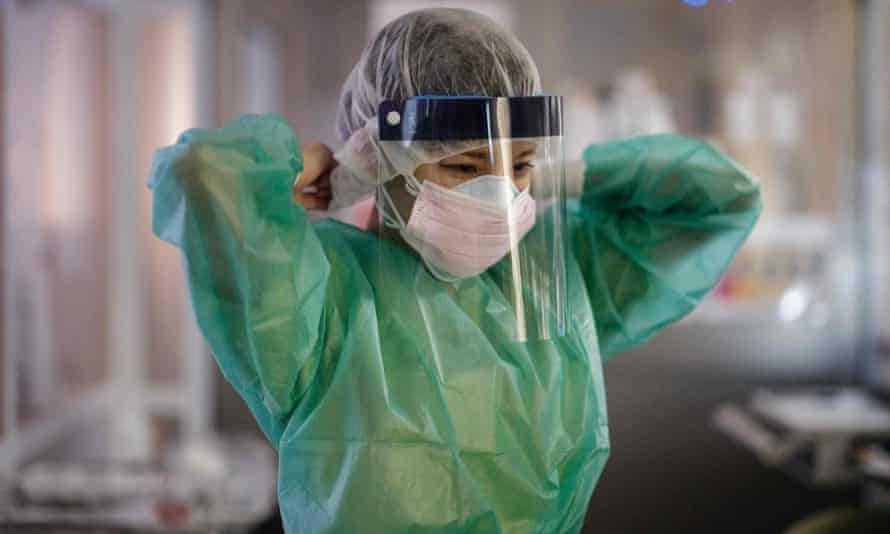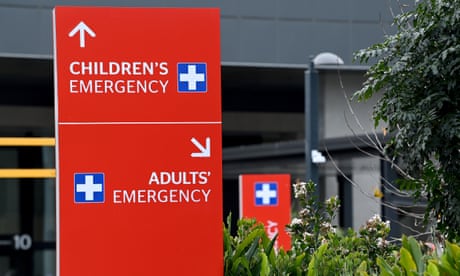Extract from The Guardian
With the Delta variant putting incredible strains on hospitals, staff used to self-sacrifice are asking about compensation for the risks they face.

Last modified on Mon 6 Sep 2021 12.54 AEST
I am a clinical assistant – what used to be called an orderly – in an intensive care unit ward at a major Melbourne hospital. Due to the latest Covid outbreak in Victoria, many of the rules of my job have shifted in just this past week, bringing with them added stress.
Previously, Covid-positive patients were kept isolated in sealed negative-pressure rooms but now the unit has been divided into two, and the patient doors have been opened in the “hot zone”, making that half of ICU a Covid-positive zone.
Consequently, personal protective equipment protocols have stepped up enormously as workers now spend their entire shift exposed to Covid. We wear uncomfortable full-length gowns, face shields and N95 masks – we joke about their fit and potential failure. Our hair is exposed and consequently cannot be touched for any reason.
We are exposed to air that is so likely to contain Covid that we cannot remove a piece of paper from this hot zone as it’s considered too dangerous. (Where that leaves our hair, I have no idea.) There are no toilets or eating areas in the hot zone and only limited equipment – this ensures a series of back-and-forth movement through air-locked doors with complete changes of PPE and the associated worries that brings.
It’s an awful burden to feel like you are a risk to your own family
The stress of this is underlying but palpable. Every shift in the hot zone, we are dealing hands-on with Covid-positive patients. It seems almost likely that we will become Covid-positive ourselves. At the end of the day, although the relief of finishing a shift and leaving the hospital is enormous and everyone lightens, we all wonder whether we are carrying Covid home with us.
There is no pandemic loading on our pay, no bonus, no official recognition – the only form of reward seems to be an influx of sweet buns and packaged hospital food being made available. Is it possible to imagine, in any other industry, having equivalent types of stress suddenly put on you without any consequent remuneration?

The hospital made sure we were all vaccinated early with Pfizer, which is great and confidence-inspiring. But we know that we can still catch Covid-19, and though it’s likely we will be less affected than unvaccinated people, this isn’t necessarily true and we could still suffer from long Covid, even if we don’t get dramatically ill initially.
My partner is in a similar position of risk through contact with me, although she is fully vaccinated. I also have two children in their 20s who live independently and are not fully vaxxed yet. It’s an awful burden to feel like you are a risk to your own family.
Many of my co-workers would feel uncomfortable talking about 'dirty money' but I know it crosses their minds
I’m very aware that it is a type of honour to help sick people, and to aid others who help sick people – doctors and nurses et cetera. Yet the question still arises: why aren’t we receiving a loading in our pay for a work situation that is an actual threat to ourselves and to our families’ long-term health?
Even raising this issue feels uncomfortable. There is an established culture of self-sacrifice in caring jobs. Many of my co-workers would feel uncomfortable talking about “dirty money” but I know it crosses their minds.
I feel that because I am working in what is considered an “honourable” job, the expectation is that that should be enough – as is made clear by my modest fortnightly pay. Expecting anything more almost seems greedy, as though to consider myself eligible for some recompense, in the way a business might, is selfish and wrong.
My co-workers and I don’t get a single dollar extra to reflect the difficulty and dangers of our current working conditions. When I see how much the pandemic affects everyone in my workplace, and I feel the increased risks we are taking, I have to ask myself: Is this really OK?
The writer works as a clinical assistant in an ICU in Victoria
No comments:
Post a Comment